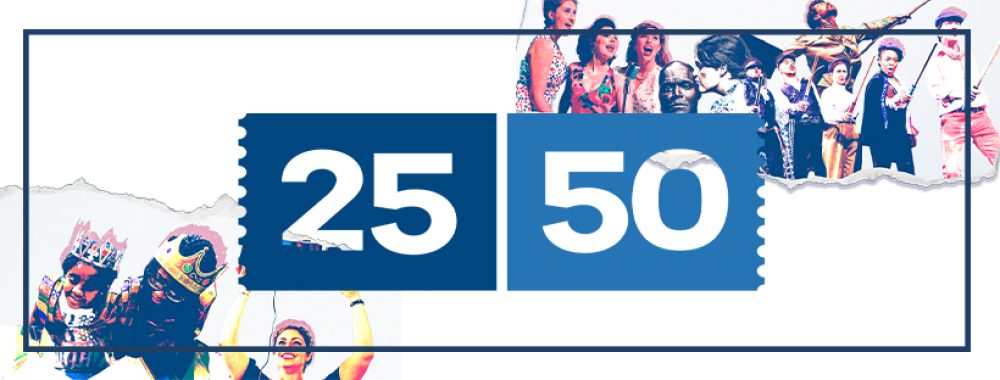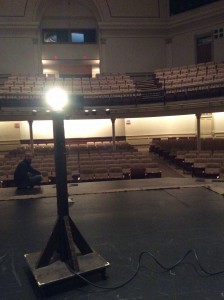Our opening nights at Notre Dame take place in Washington Hall. The Hall is an old building, with bats in the rafters, but it was modernised in the 1950s. The stage is more recent than that I think and the lighting rig is good. The interior of the theatre itself is a little sparse. When I comment on that, Kathleen, who works front of house, tells me that there used to be some lovely murals of George Washington, Shakespeare, Molière, Mozart, Beethoven etc. Semi randomised great artists and the president. They were whitewashed in the 50’s, when everyone was so zealous about being austere. I ask out of curiosity if perhaps they were grotesquely badly painted. “Perhaps it’s a mercy that we are spared them”. Kathleen insists that they were quite lovely. In which case, what a shame.
And our run begins in earnest. Three nights only, and a packed house on the third, with good audiences on the first two. The show is still breathing, moments are changing, landing differently. We are surprising each other. It feels right. Specific where it needs to be and free where it needs to be. The Notre Dame audiences are reactive and vocal, and despite being a little further away from them we still feel able to include them in our world, and play to, for and with them. On the first night a small child is laughing throughout the show. On every night, the upper and lower floors stand at the end. American audiences are generous like that. Scott encourages us to hold our hands out wide to, essentially, imitate Fonzy as we take the bow. “You’re all so humble and … English.” We attempt to allow ourselves such indulgence.
On the final night, a bat comes out in the interval, and panics at all the people panicking at it. As it circles the hall, we are drawn to the monitor just in time to see it fly right onto the stage accompanied by an audible gasp, and shoot up into the rafters above the playing space. It remains there for the rest of the show, and I find myself wondering how / if we might have been able to incorporate it had it done that while we had been on stage. And also whether or not it is going to bring guano into Messina, and make Messina that little bit messier. Thankfully that’s he last we see of it.
Since we have arrived in America, we have cut over 200 lines of dialogue. It feels leaner for it, and we wonder why we ever tried to do it complete. As a group we are coming together more and more, learning to trust each other and play off each other. It’s only going to tighten and deepen over time. Notre Dame has been a delightful place to start our run. A family. A home. As we all head to Chicago in a taxi full of bags, we realise that now the tour begins in earnest. Our friends in the room, in the lighting box, in O’Rourkes afterwards, on and around the campus, they all stay there. Hereafter it’s just the five of us and the friends we make on the way. Next stop Utah. But first, a weekend in CHICAGO!
(By Al Barclay)

